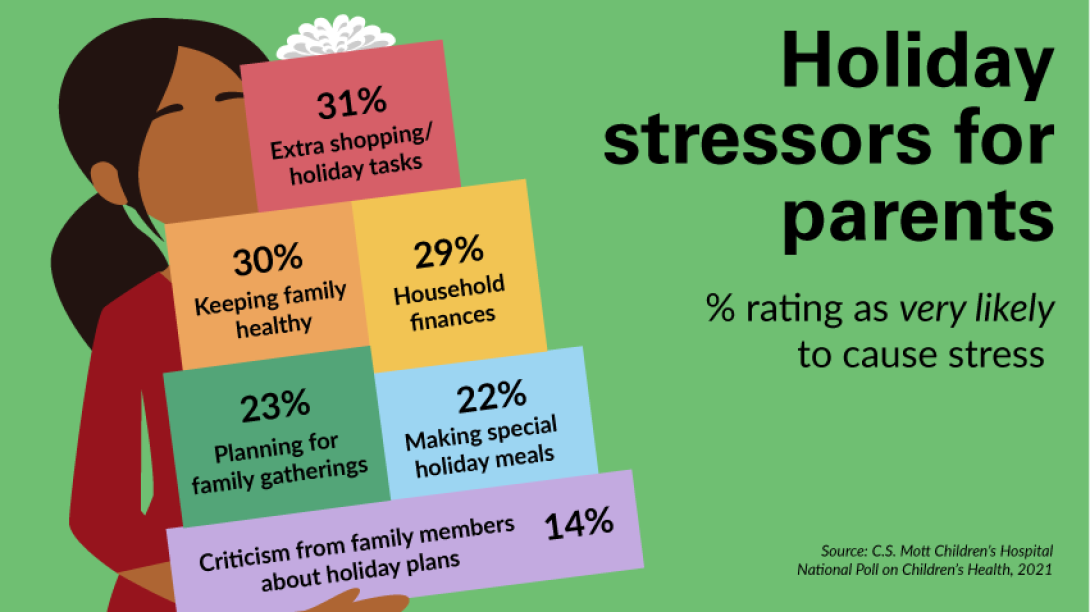National Poll: 1 in 4 parents admit they set overly idealistic expectations, and mothers are twice as likely to be stressed by preparations.
9:48 AM
Author |

It's the most wonderful time of the year – happy family gatherings, joyful reactions to gifts under the tree and carrying on cherished traditions.
At least that's the picture many parents imagine creating for their children during the holidays.
But for many moms and dads, trying to live up to that ideal may bring stress and anxiety that takes away from the holiday magic for their kids, a new national poll suggests.
One in five parents believe their child has unrealistic expectations for the holiday season while one in four admit that they set overly idealistic expectations of themselves, according to the C.S. Mott Children's Hospital National Poll on Children's Health at University of Michigan Health.
And parents recognize that these pressures may not be good for their family, with one in five acknowledging that their stress level negatively affects their child's enjoyment of the holidays.
"People are surrounded by images depicting the holidays as a time of peace, love and joy. Many parents want to give their children those perfect magical memories to treasure for years to come," said Mott Poll co-director Sarah Clark, M.P.H.
"But all of the behind the scenes work to make that vision come true could have the opposite effect for some families. Excessive parental stress can add tension and diminish the joy children associate with the season."
While nearly all parents polled say that the holidays are generally a happy time for their family, one in six rate their stress level as high during the holiday season – with nearly twice as many mothers experiencing high stress than fathers.
"The holiday hustle and bustle, long to-do lists, and social gatherings are among the biggest stress triggers," Clark said.
"Stress may also be tied to negotiating holiday plans with different family members and the cost of gifts, travel and other holiday activities. With the resurgence of COVID in some parts of the country, trying to keep all family members healthy can cause additional worry."
Even the holiday break itself can be a demanding time with kids at home – more than a third of parents polled say they're relieved when their child goes back to school.
Top holiday stressors
More common holiday stress culprits and how families manage them, according to the nationally representative poll report that included 2,020 parents of children ages 1-18:
Too much on the to-do list
Nearly a third of parents say stress comes from extra shopping and holiday tasks, keeping family members healthy and household finances.
For others, it's family gatherings (23%), making special holiday meals (22%), and criticism from family members about holiday plans (14%). More mothers than fathers rate each aspect of the holidays as very likely to cause stress.
For many parents, stress is tied to placing unrealistic expectations on themselves to create a joyful holiday even if they don't have enough time, money or help to celebrate in the way they've envisioned.Sarah Clark, M.P.H.
"For many parents, stress is tied to placing unrealistic expectations on themselves to create a joyful holiday even if they don't have enough time, money or help to celebrate in the way they've envisioned," Clark said.
Clark suggests families sit down and talk about what everyone looks forward to during the season. Maybe it's watching certain holiday movies, seeing Christmas lights at a favorite venue, or spending a day baking and decorating sugar cookies. Don't skip activities that truly are family favorites. But also look at what you can cut or minimize. Do you have to go to every holiday function, make certain foods or continue gift exchanges with extended family?
"One strategy is to talk as a family about holiday plans and priorities. Parents may have misconceptions about what their child's favorite holiday memories and traditions are – they could actually be much simpler than you think," Clark said.
Families may decide to modify certain holiday traditions or have one less item on the menu for the holiday dinner, for example.
"Once you know what's important to keep, you can discuss reducing effort for some holiday preparations," she said. "It's OK for traditions to evolve over time, and for families to redefine what the 'perfect' holiday looks like to them."
Not taking enough breaks to refuel
Parents polled report different ways to fill their energy tanks when holiday strains mount.
The most effective ways to reduce their holiday stress include time alone (71%), listening to music (55%), exercise (46%), prayer/religious services (28%), getting help from other family members (23%) and work (15%).

More mothers say help from family members relieves burdens, while more fathers look to work as a way to reduce their stress. Whatever the method, parents should remember that their kids are watching and learning, Clark says.
"The holiday season may be a time for parents to model good mental health hygiene, by verbalizing how they recognize and try to relieve stress," Clark said. "This approach is an invitation for children to share their own feelings of stress and a reminder to take action when their stress is elevated."
For example, parents might say, "I'm really feeling overwhelmed with so many things on our to-do-list for today. Let's take a 5-minute dance break before we get back to checking things off our list."
Trying to do it all alone
Moms polled reported the most stress during the season. This could be because they often take primary responsibility for planning holiday activities, including cooking, shopping, decorating, and hosting.
Like Podcasts? Add the Michigan Medicine News Break on iTunes, Google Podcasts or anywhere you listen to podcasts.
When mothers don't receive or won't accept help from other family members, those responsibilities can start to feel overwhelming.
Clark says parents who take on the bulk of holiday preparations may need to let go of some things – along with expectations that they must be done a certain way – and assign each family member a specific holiday task. The key, however, is promising to be satisfied even if that task is done differently than in years past.
"Unrealistic expectations are especially common among parents who describe themselves as having high stress levels around the holidays," Clark said.
"They may need to change their mindset and delegate, so they don't burn themselves out physically and mentally."
Breaking routines
Among parents of children in school, 23% of mothers and 14% of fathers say that having their child at home more during the school break causes stress.
"An underappreciated source of stress for many parents is having school-age children spending more time at home during the holiday break," Clark said. "In most families, school forces a daily routine, with specific times for waking up, getting out the door, bedtime, and meals."
During the holiday break, however, children and teens may feel like they should get to break some of the normal rules that are in place during school days.
Most parents polled say they keep similar or slightly relaxed routines during winter break, but others acknowledge waiving their usual rules about screen time (20%), bedtime (19%), having friends over (14%), junk food (13%), and sleepovers (13%).
"It's natural to want children to have fun, but parents should strive for a happy medium that gives kids a break from the structured schedule of the school year without experiencing lack of sleep or a poor diet that may cause irritability," Clark said.
"Sticking to some routines will likely help make everyone happier and family time together more enjoyable."

Explore a variety of healthcare news & stories by visiting the Health Lab home page for more articles.

Department of Communication at Michigan Medicine
Want top health & research news weekly? Sign up for Health Lab’s newsletters today!





